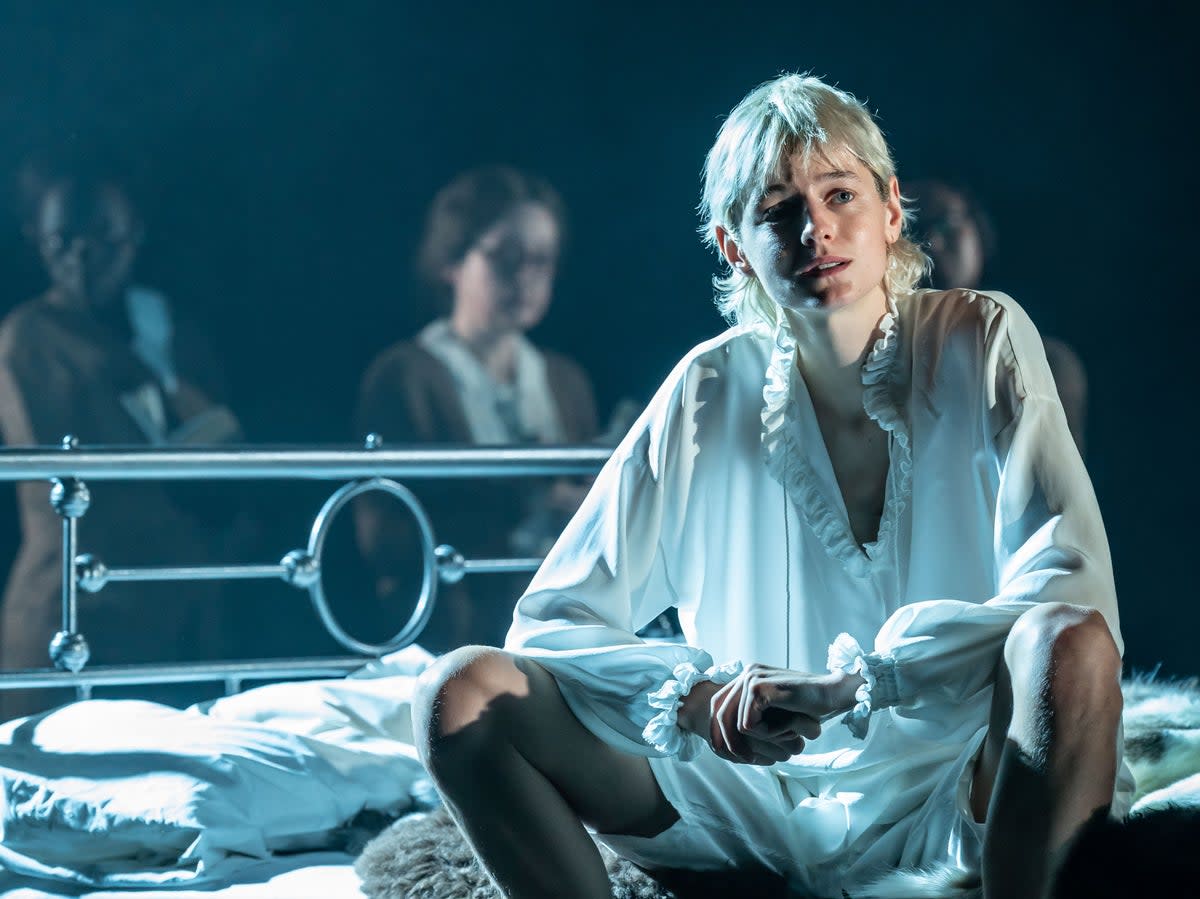Orlando review: Emma Corrin is magnificent as Woolf’s punk rock protagonist

This is Virginia Woolf turned up to a nine. No, seriously: Michael Grandage’s adaptation of her most punk rock novel begins with nine bespectacled, cardiganed Woolfs roaming the stage, reading, writing, thinking. All but two of the cast – including its only man, Richard Cant – play the novelist at various moments throughout the play: a guiding light, but also a nod to the freewheeling fluidity that characterises this vivid celebration of a show.
At its heart is a highly magnetic performance from Emma Corrin, playing the handsome young nobleman who time-travels through centuries and, at the age of 30, wakes up as a woman. It’s hard to remember a bolder entrance than this: Orlando walks on stage in a silky shirt, stretches, and happens to reveal the fact he’s not wearing any pants. He then cheekily breaks the fourth wall, asking, “Shall I compare me to a summer’s day?” Corrin, after appearing in a couple of disappointing films, delivers a joyful and groundbreaking Orlando that feels like a calling card for the stardom that The Crown first promised. They’re magnificent. Whether bowing to Elizabeth I or falling in love on a frozen pond, they’re just as capable of humour as they are pathos, with Orlando by turns intense, charismatic and swoonworthy.
Where the novel creates an overwhelming world of colour and history, Peter McKintosh’s set is bare, the action summoned instead by language – “Try words,” as the chorus of Woolfs advise Orlando. This can sometimes make the show feels static, without the novel’s heady perpetual forward motion – but here the slipperiness of the changing centuries and Orlando’s journey through gender becomes much more about the mutable power of identity. “Who am I?” is the question that Orlando explores from the first scene to the last.
The cast joyride through different roles, with the exception of Corrin and Deborah Findlay, who plays a proper “cor, blimey” housekeeper Mrs Grimsditch. The character, while sometimes distractingly hammy, accompanies Orlando through the years with a no-nonsense matriarchal spirit and a rail of fantastical costumes, and often gets the funniest lines (the 19th century has “in-door sanitation, which is lovely! And Tories, which is…”).
Neil Bartlett’s bouncy script playfully nods to our changing contemporary attitudes – “ladies and gentlemen. Oh, sorry, everyone,” is how Mrs Grimsditch addresses the audience. We see Orlando meeting suitors as a man, and later as a woman; when female, they bewilder a captain by appearing in their underwear. Here, seen from both sides, gender – or our fixed ideas about it – often looks ludicrous, but we’re also reminded how unkind history has been to women in particular, with many references made to their presumed inferiority.

Even with its pared-back staging, Grandage’s show often looks incredibly beautiful. I wanted to take a picture of the scene of the 1607 great freeze, in which Corrin stands centre stage, surrounded by twinkling stars and dry ice; it’s magical. And all hail the costume designer – also McKintosh – for some seriously stunning creations, including a very fancy red dress that Orlando discards after mere minutes. True to Woolf’s spirit, the show’s strongest charm really is its inventiveness and creativity, and its final scene, though a little polemical, is a triumph, finding a conduit to genuine emotion. Who is Orlando? Only Corrin’s greatest role since Diana.
Garrick Theatre, until 25 February


